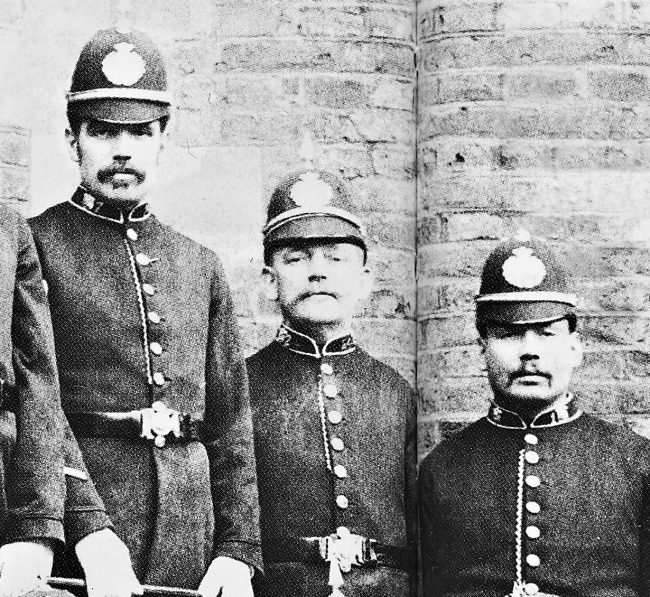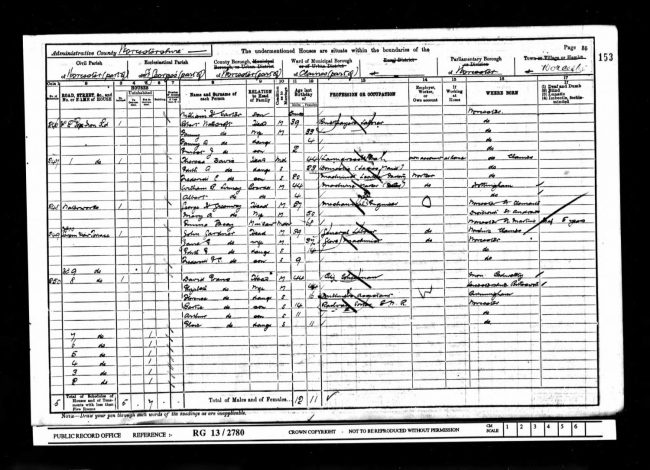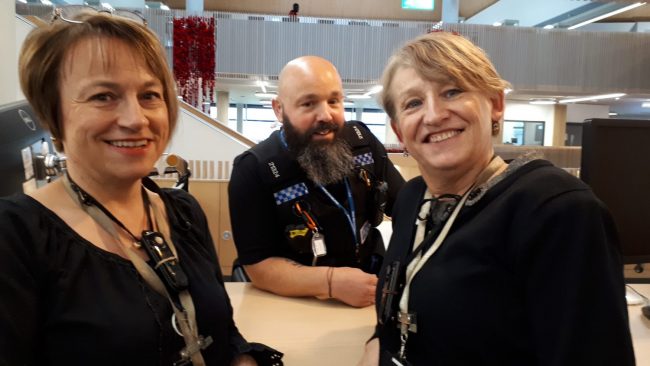A visit from a family history detective
- 13th December 2018
People visit the Archive Service for many different reasons. We have academic researchers, local history researchers, those looking to settle legal disputes through evidence found and, of course, family history researchers. There are many different motivations for looking into one’s family history, and recently we had the pleasure of assisting a researcher with a very interesting piece of detective work!
PC Richard Foulkes recently visited the Original Archive Area at The Hive on a mission to find evidence of an ancestor in amongst our records. Originally from Newcastle, PC Foulkes moved to London to work for the Metropolitan Police for 27 years, before a more recent move to West Mercia Police. Prior to moving here, PC Foulkes had no idea he had any connection with the city until an unexpected revelation mentioned that his great, great grandfather, David Evans, may also have been a policeman in Worcester. What an incredible coincidence!
PC Foulkes had never used archival records or attempted to trace his family history prior to his visit to us, but he wanted to find out if there was any evidence of PC Evans in our records. If evidence could be found, then perhaps there was a possibility to use his ancestor’s police badge number as part of his own unique identification number. Our staff were intrigued by this story and set about helping PC Foulkes search through our records.

PC David Evans (centre) in uniform outside the Guildhall, Worcester.
Worcestershire Archive Service holds the original archives of the West Mercia Police Authority, so this was the first place to start looking. Unfortunately, there was no evidence of a PC David Evans amongst these records. The next step was to look at the records of the predecessors of West Mercia. We also hold the records of Worcester City, including those of the Watch and Lighting Committee, which was one of many Worcester Corporation committees. This was originally known as the Watch Committee and it held responsibility for policing in Worcester. The committee was also responsible for the provision, maintenance and lighting of gas street lamps. Later duties included extinguishing of fires and licensing and regulation of places used for public performances.
Amongst the Watch and Lighting Committee records are handwritten Minute books, which contain all sorts of information, including the appointment, promotion and resignation of police constables; uniforms; provision and lighting of street lamps; commendations and complaints made against police constables; fires, firefighting and ambulances; gratuities to police; new legislation; entertainment licenses; and road, river and tram traffic.
PC Foulkes ordered up a volume of the Watch and Lighting Committee minutes, dated 1884 to 1889, which he believed was when his great, great grandfather would have been serving in Worcester. A quick check in the index for this volume revealed that PC Evans was indeed documented inside!

The first entry in the Watch and Lighting Committee minute books that mentions PC Evans’ appointment, dated 23rd October 1885.
Reference 496.5 BA9360/E1/3/2, page 134
Not only was PC Foulkes able to find an entry for his great, great grandfather’s appointment, he was also able to find evidence of his badge number – 24.

A later entry in the Watch and Lighting Committee minute book, which gives evidence that PC Evans held badge number 24, dated 6th August 1886.
Reference 496.5 BA9360/E1/3/2, page 238
In addition to the information in the minute books, PC Foulkes was able to find out a bit more about PC David Evans. A 1901 Census entry that shows he lived with his wife and four children on Pope Iron Road, Worcester.

A copy of the 1901 Census, showing PC Evans living in Pope Iron Road, Worcester.
© Crown Copyright Image reproduced courtesy of The National Archives. Taken from Ancestry.co.uk.
There is a book held in the local lending library at The Hive, called The Spike, Worcester City Police: the lives, the crimes and the violent times, Part 1 1833-1900, written by local author Bob Blandford. This book, which was written based upon research using the original archives held by our service, proved useful in shedding a little more light on PC Evans’ career. The books states that he served between 1885 and 1910, and features some excerpts from Berrow’s Worcester Journal that mention PC Evans. The volume also revealed yet more coincidences in PC Foulkes’ tale; not only was his great, great grandfather also a police officer in Worcester, but PC Evans also happened to retire on PC Foulkes’ birthday! Even more of a coincidence is that the book shows the officer to hold badge number 24 in 1859, before PC Evans was recruited, was a man named Richard Fowkes!
Satisfied with his research and now armed with the evidence required to prove his great, great grandfather’s badge number, PC Foulkes promised to return to see us if he was granted permission to use the number. Several weeks later, we were delighted to see him return with a shiny new badge in place! West Mercia Police had generously agreed to allow PC Foulkes to use his ancestor’s badge number. Of course, police unique identification numbers are much longer now than they were in the 1880s, so the badge number ’24’ has been incorporated as his last two digits.

PC Richard Foulkes visits Archive Service staff, proudly wearing his new badge number
PC Foulkes said about his time researching in the archives:
“This has been an amazing, personal, sentimental journey of discovery where I found the archive staff there to be genuine, friendly, positive and superbly helpful. Their diligence, professionalism and expertise uncovered the specific data I wanted – my Great Great Grandfather’s police warrant number. Without their help I would not have found out this priceless information, even as a detective for 16 years of my career! The main reason I decided to transfer to Worcester Police for my remaining last 3 years of service, back into uniform as a Police Constable, is in honour of my relative’s memory, literally to walk in his footsteps, wearing his warrant number. This research from the archives has firmly cemented and connected my original family roots to Worcester. Thank you to the Archive Service and West Mercia Police for making this happen.”
It was a wonderful experience for our staff to see PC Foulkes return with his new badge number. It is such a delight to see how the records we hold can affect people’s lives in a positive way. We were so happy to help PC Foulkes with his research and that West Mercia allowed him to use his great, great grandfather’s number. What a wonderful way to have a part of his heritage with him every day whilst serving on the force.
Remarkable!
This was such a rewarding archive experience!